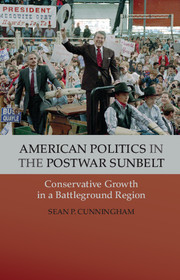Book contents
- Frontmatter
- Dedication
- Contents
- Acknowledgments
- Introduction
- 1 Convergence, Metropolitanization, and Anticommunism
- 2 Race, Rights, and the Liberal Consensus
- 3 Wars against Liberalism
- 4 Southern, Suburban, and Sunbelt Strategies
- 5 Mobilizing the Religious Right in the Politicized “Bible Belt”
- 6 Reagan’s Sunbelt, Reagan’s America
- 7 Shades of Red, Shades of Blue
- Epilogue
- Index
- References
2 - Race, Rights, and the Liberal Consensus
Published online by Cambridge University Press: 05 July 2014
- Frontmatter
- Dedication
- Contents
- Acknowledgments
- Introduction
- 1 Convergence, Metropolitanization, and Anticommunism
- 2 Race, Rights, and the Liberal Consensus
- 3 Wars against Liberalism
- 4 Southern, Suburban, and Sunbelt Strategies
- 5 Mobilizing the Religious Right in the Politicized “Bible Belt”
- 6 Reagan’s Sunbelt, Reagan’s America
- 7 Shades of Red, Shades of Blue
- Epilogue
- Index
- References
Summary
Anticommunist conservatives were a developing force in American politics during the early postwar decades, especially in the Sunbelt, and especially within the Republican Party. But despite the visibility of that force, it was clear throughout most of the 1950s and early 1960s that the nation’s politics remained under the predominant influence of establishment liberals, pragmatic moderates, and others operating within or externally sympathetic to the Democratic Party’s New Deal coalition. Having revolutionized the relationship between the federal government and the national economy during the 1930s, New Deal liberals emerged from World War II triumphant, optimistic, and confident. They then fought the early years of the Cold War with a resolute commitment to containing communism abroad, while responsibly preparing the military for the possibility of war. Along the way, the nation’s economy grew substantially, with more Americans moving into the middle class than at any time in the nation’s history.
Out of this formed a mainstream political culture that many historians have called the liberal consensus. This consensus essentially underscored a widespread acceptance for New Deal programs and goals and created a relatively centrist political culture that gravitated to the moderate middle while marginalizing extremes on both the Left and the Right. Postwar American liberalism was stereotypically rational, technocratic, and patient. By 1960, it also appeared to most as trustworthy and successful. Despite the nascent surge of anticommunism, most Americans, including those living in the Sunbelt, remained confident that their country could and would overcome any and all challenges.
- Type
- Chapter
- Information
- American Politics in the Postwar SunbeltConservative Growth in a Battleground Region, pp. 56 - 90Publisher: Cambridge University PressPrint publication year: 2014



